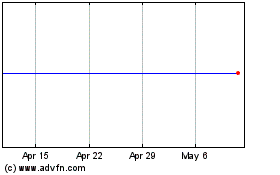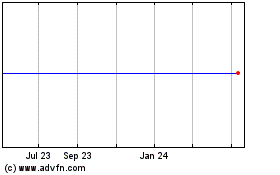Debt Market Hammers BP, Partners For Second Day
June 02 2010 - 7:20PM
Dow Jones News
The cost of insuring debt issued by BP PLC (BP, BP.LN) and its
partners in the Deepwater Horizon disaster jumped dramatically
Wednesday, and the price of their bonds dropped as analysts began
to estimate the cost of the accident, the worst oil spill in U.S.
history.
At one point, parties selling insurance--in the form of credit
default swaps--on nonpayment of debt issued by Transocean Inc.
(RIG), which owned and operated the drilling rig on behalf of BP,
were demanding extra payments at the outset of the insurance
contracts. The phenomenon, called "trading upfront," is a rare
event for an investment-grade company.
Declines in the debt markets were for the most part in contrast
to the reaction of the stock market, suggesting bond investors,
with their lower risk tolerance, have a dimmer view of how the
disaster will affect BP and its partners. BP shares, for example,
rose 3.1% even as risk premiums on its bonds were growing by as
much as 1.7 percentage points. Risk premiums--the added return
investors demand to own the bonds instead of super-safe
Treasurys--move inversely to the value of the underlying
credit.
"Where there is uncertainty ... and no clear-cut measure of how
or when it could get resolved, investors head for the hills," said
Susan Jansen, head of U.S. credit research at Nomura Securities
International in New York. "Bond investors are looking back at
long-term litigation scenarios they have seen for tobacco liability
and asbestos, and understanding it may be years before they really
understand what the final costs are."
Early reckonings of those costs from Credit Suisse and Tudor,
Pickering, Holt & Co. Securities were not encouraging. Credit
Suisse put the tally at $15 billion to $23 billion, not including a
separate $14 billion of claims from the tourism industry and
fisheries. Tudor Pickering put the tally even higher: $35 billion
to $40 billion.
BP is on the hook for 65% of the damage, while the rest is split
among its partners in the project: Anadarko Petroleum Corp. (APC)
at 25% and Mitsui & Co. (MITSY, 8031.TO) at 10%. Transocean
doesn't own a stake in the oil field, but it is likely to be a key
part of any lawsuits.
"Transocean will certainly field a large number of lawsuits and
will incur significant legal fees over a number of years to come,
but should ultimately be cleared of clean-up and related economic
damage liability," said Brian Gibbons, senior oil and gas analyst
at CreditSights in New York. "There is massive uncertainty that
will remain an overhang on the stock and bonds for some time to
come. Credit investors don't have the risk tolerance to wait this
out."
The risk premium, or spread, on BP Capital Markets' 5.255% bonds
due in 2013 was quoted at 447 basis points--4.47 percentage points
over comparable Treasurys--which was 1.97 percentage points wider
than Tuesday. The spread on Anadarko's 7.625% bonds due 2014 were
quoted at 4.87 percentage points, wider by 1.98 percentage
points.
The spread on Transocean's 5.25% bonds due 2013 were quoted at
6.23 percentage points late Wednesday, according to MarketAxess;
that was 1.93 percentage points wider than the day before.
Credit default swaps protecting the holder against non-payment
on Transocean debt were quoted at 3.5 points, according to broker
Phoenix Partners, before falling back to 465 basis points without
any upfront fees. The price with upfront fees would have cost a
protection buyer $500,000 per year over a five-year period to
insure $10 million of Transocean debt, plus a one-time upfront
payment of $350,000; the regular quoted price would cost $465,000
per year for $10 million notional of protection.
Transocean has invoked a 19th century law, the Shipowner's
Limitation of Liability Act of 1851, in an effort to limit its
liability to just under $27 million. The U.S. Justice Department on
Tuesday told a federal court in Houston that the law should not
apply to claims made by the U.S. government or the states.
At the same time, Attorney General Eric Holder said the Justice
Department had opened civil and criminal investigations into the
accident.
Despite all this, some analysts and others said they believed
the reaction in the credit markets was exaggerated.
Jaimin Patel, a credit analyst at Societe Generale, said the
volatility seen in oil and gas stocks associated with the disaster
was directly tied to negative headlines, in the same way that the
companies' positions improved when it first appeared that BP's
so-called 'top kill' solution might work. "Today was something of a
reversal of that," he said.
The companies involved, BP, Transocean, Anadarko, oil services
provider Halliburton Co. (HAL), and to a lesser extent Cameron
International Corp. (CAM), which made the blowout preventer, are
all traditional, investment-grade names. So the reaction to
Transocean in particular, a strong BBB name, was surprising.
-By Katy Burne, Dow Jones Newswires; 212-416-3084;
katy.burne@dowjones.com
Cooper Cameron (NYSE:CAM)
Historical Stock Chart
From Sep 2024 to Oct 2024

Cooper Cameron (NYSE:CAM)
Historical Stock Chart
From Oct 2023 to Oct 2024
